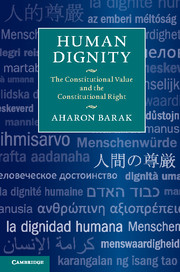Book contents
- Frontmatter
- Contents
- Preface
- Acknowledgements
- Table of Cases
- Part I Fundamental concepts and sources
- 1 The various aspects of human dignity
- 2 The intellectual history of the social value of human dignity
- 3 Human dignity as a value and as a right in international documents
- 4 Human dignity as a value and as a right in constitutions
- Part II Human dignity as a constitutional value
- Part III Human dignity as a constitutional right
- Part IV Human dignity in comparative law
- Bibliography
- Index
- References
3 - Human dignity as a value and as a right in international documents
Published online by Cambridge University Press: 05 February 2015
- Frontmatter
- Contents
- Preface
- Acknowledgements
- Table of Cases
- Part I Fundamental concepts and sources
- 1 The various aspects of human dignity
- 2 The intellectual history of the social value of human dignity
- 3 Human dignity as a value and as a right in international documents
- 4 Human dignity as a value and as a right in constitutions
- Part II Human dignity as a constitutional value
- Part III Human dignity as a constitutional right
- Part IV Human dignity in comparative law
- Bibliography
- Index
- References
Summary
Human dignity in legal discourse
Until the middle of the twentieth century, the history of human dignity was part of the history of ideas. From the middle of the twentieth century it also became an inseparable part of legal history. It became a central factor in the discourse on rights – both on the international and the national plane. Indeed, scores of multilateral international conventions expressly include human dignity – whether in the preamble or in the body of the convention. In many of the constitutions that were enacted or amended after the Second World War, human dignity was established as a key concept.
What caused this change? The atrocities of the Second World War, particularly the Holocaust of the Jewish people, are the primary factors that led human dignity to become a central factor in legal discourse. The recognition that those interested in protecting democracy must protect human rights, and that those who wish to protect human rights must recognize human dignity, became more prevalent. In its wake the Second World War brought the human rights revolution, and it was in this framework that the human dignity revolution took place.
The primary push for this change can be identified in three legal texts – two international documents and one constitutional provision. The beginning of the change can be found in the preamble to the Charter of the United Nations. This charter was enacted in 1945, right after the end of the Second World War.
- Type
- Chapter
- Information
- Human DignityThe Constitutional Value and the Constitutional Right, pp. 34 - 48Publisher: Cambridge University PressPrint publication year: 2015



